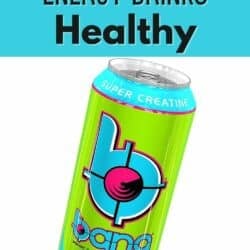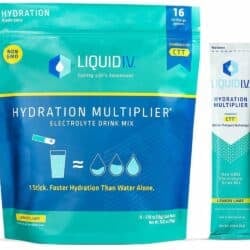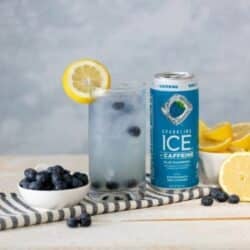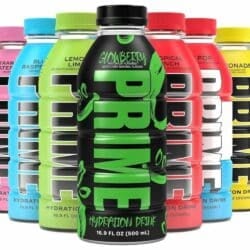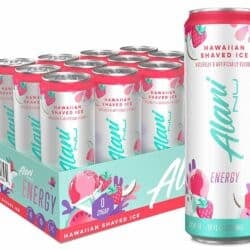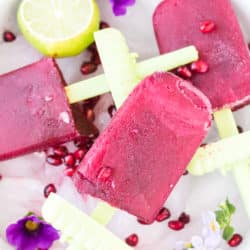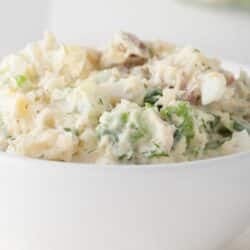Is Bang Energy Bad For You (From a Nutritionist)?
This blog post will review whether or not Bang Energy Drinks are bad for you? Find out what this product’s nutrition pros and cons are and what better alternatives you may wish to consider. For people following a clean eating diet, Bang cannot be considered a healthy product because it contains so many processed ingredients.
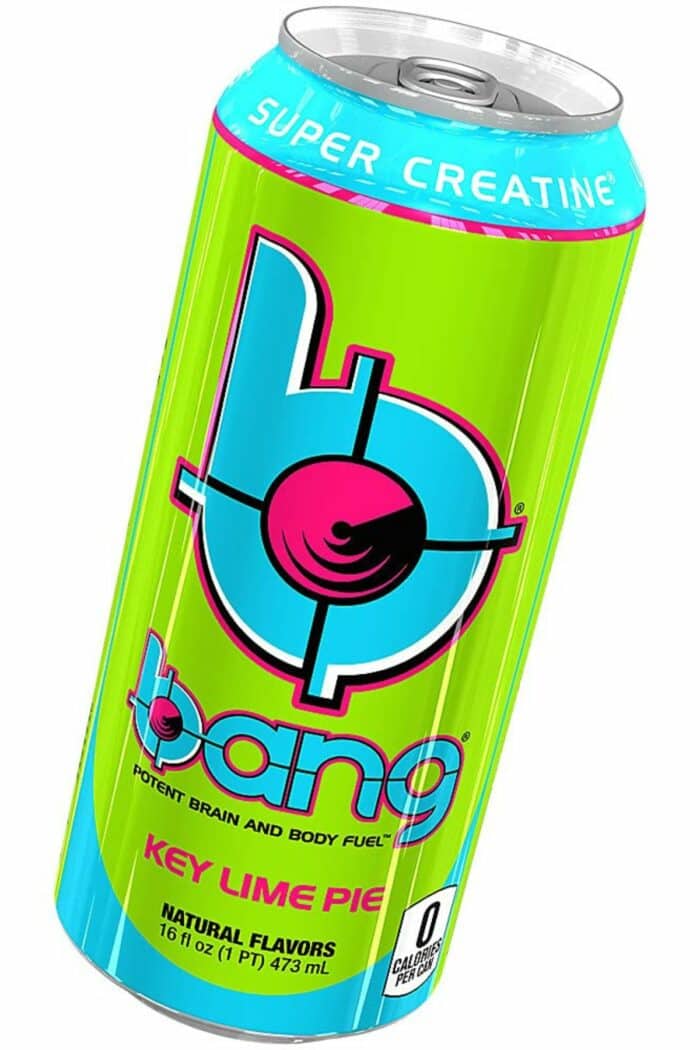
Bang Energy Drinks Facts
Jack Owoc launched VPX in 1993. His goal was to manufacture a range of high-quality energy drinks and nutritional supplements backed by scientific research and extensively tested. Bang Energy Drinks are part of VPX.
Bang Energy has three energy drink brands, Bang, Redline, and Meltdown, a caffeine-free range, and VOOZ Hydration Sensation, a sports hydration drink with immune-boosting properties and electrolytes.
VPX designed these products for people who need extra energy and hydration. The products are available in a range of flavors in 37 countries worldwide. Caffeinated beverages and products like Red Bull and Monster energy drinks are competitors of Bang drinks.
The nutrition label lists many ingredients, including carbonated water, citric acid, caffeine, preservatives, sucralose, EAAs, creatine, EDTA, and B vitamins.
Bang Energy Main Ingredients
Bang Energy drinks have a long list of ingredients, some highly processed and potentially unhealthy, and others relatively healthy.
The product contains natural flavors and Coenzyme Q10, but the ingredients include preservatives, an artificial sweetener, and caffeine, which can be harmful in high doses.
Bang Energy’s Key Lime Pie flavor contains the following ingredients:
- Carbonated Water
- Natural Flavors
- Citric Acid
- Caffeine Anhydrous
- Sodium Benzoate (Preservative)
- Potassium Citrate Monohydrate
- Sucralose
- Essential Amino Acids (L-Leucine, L-Isoleucine, L-Valine, L-Lysine, L-Threonine, L-Phenylalanine, L-Histidine, L-Methionine, L-Tryptophan)
- Potassium Phosphate Dibasic
- Vitamin C (Ascorbic Acid)
- Potassium Sorbate (Preservative)
- Magnesium Chloride
- Creatyl-L-Leucine
- Calcium Chloride
- Calcium Disodium EDTA
- Vitamin B3 (Niacinamide)
- Coenzyme Q10
- Vitamin B6 (Pyridoxine Hydrochloride)
- Vitamin B12 (Methylcobalamin)
Here is some more information about the major ingredients found in Bang Energy drinks so you can decide if Bang is bad for you or not.
Coenzyme Q10 (CoQ10)
CoQ10 is a naturally-produced antioxidant that helps generate cellular energy.
It has many excellent health benefits for most people and healthy adults. CoQ10 may help treat heart failure, increase fertility, improve skin health, and reduce headaches. One of its main functions is to generate cellular energy.
Over time, our natural CoQ10 production decreases, and some people feel the need to supplement this.
Always be sure to check with your healthcare provider before adding supplements to your routine. Your doctor can determine if there are potential health risks or negative effects that may affect your overall health.
Creatine
Creatine is an amino acid naturally produced in the body’s muscles and the brain. The liver, kidneys, and pancreas make around a gram of creatine daily, and you can get more of it from red meat and seafood.
Creatine is stored in the muscles, which the body uses to boost energy and increase muscle mass and strength.
Because of its effectiveness in energy production, people take synthetically produced creatine to boost athletic performance and build muscle. Creatine is also used to treat health conditions like heart, brain, and muscular conditions, and it may help lower blood sugar and could help improve brain function.
Besides all the health benefits, it’s important to note that excessive or large amounts of creatine consumption can cause nasty side effects like muscle cramps, bloating, dehydration, weight gain, and even kidney and liver damage.
Be sure to talk to your doctor to take a closer look if it’s right for you.
L-Tryptophan
L-tryptophan is an essential amino acid that makes proteins.
The body absorbs this amino acid and converts some of it into 5-HTP and then serotonin, a hormone that helps nerve cells communicate. It helps regulates our moods.
Research has shown that L-tryptophan may help treat severe PMS, depression, insomnia, and other conditions.
Essential Amino Acids (EAAs)
Amino acids are organic compounds that help our bodies grow and function. They help build muscle and regulate immune function.
There are 20 different amino acids, nine of which are classified as essential.
Our bodies can make nonessential amino acids, but we need to include essential amino acids (EAAs) in our diets through animal proteins like meat, poultry, and eggs or some plant foods like soy.
Sucralose
Sucralose is a highly processed, chlorinated zero calorie and zero sugar sweetener.
The human body can’t metabolize this ingredient. Although the FDA approves sucralose, it is a controversial ingredient that some health-conscious people don’t consider as healthy.
Studies have shown that consuming sucralose over time can cause significant long-term health implications. It can cause inflammation that may result in diabetes and obesity. Sucralose also may harm the gut microbiome because it lowers the good bacteria needed for the gut to function optimally.
It’s best to apply caution when consuming sucralose and to avoid using it over the long term.
This ingredient is also on the ingredients list for other diet sodas and energy drinks.
See my related article about the nutrition pros and cons of Sparkling Ice.
Nutrition Pros
Although there’s no added protein in Bang Energy drinks, they contain CoQ10 and amino acids, which our bodies need to produce proteins, and grow and repair body tissue.
The brand has two caffeine-free options available, the caffeine-free range and the hydration range.
Nutrition Cons
Bang Energy drinks contain highly processed ingredients, including preservatives, sucralose, and EDTA. Sucralose is a highly controversial ingredient that has several health risks.
So, even though these drinks are sugar-free with virtually zero calories, they are not sweetened by a great alternative (see my list of natural sugar substitutes).
Most drinks in the Bang Energy range contain between 300 to 316 milligrams of caffeine in a single serving, which could cause side effects, especially if you have more than one serving daily. Having this high amount of caffeine could cause potential risks, especially for young adults.
See my related article, “Is Celsius Healthy?“
Another potential downside to Bang Energy drinks is that by combining caffeine and creatine, the caffeine may decrease the effectiveness of the creatine.
Nutrition FAQs
Even though Bang Energy drinks contain some healthy ingredients, they also have several unhealthy ingredients. As a certified holistic nutritionist, I do not consider this a healthy product to consume. Instead of using highly processed, unnatural drinks for energy or as a nutritional supplement, it’s better to lead a healthy lifestyle and eat real foods that energize you.
Some Bang Energy drinks are caffeine-free. Others contain 300mg to 316 mg of caffeine, which is as much as you’d find in around three cups of coffee. Since this is close to the recommended limit for caffeine per day, 400mg, it’s best not to have more than one serving per day.
While having caffeine intake may help mental focus, high levels of caffeine can also have negative side effects including high blood pressure, anxiety, and unintended weight loss.
VPX markets Bang Energy drinks as sports drinks and supplements. The drinks contain ingredients that will give you energy. It’s up to you to decide whether to use this product or find energy through a healthy lifestyle and a real food diet.
Some of the Bang Energy drinks contain high quantities of caffeine, which is unsafe for children and some adults to drink. For instance, pregnant people are generally advised to limit caffeine consumption.
Adults should be aware of all the ingredients, and if they choose to have these drinks, they should do so in moderation.
No, Bang Energy drinks don’t contain any sugar, so you won’t experience a sugar crash. However, it’s important to note that they contain sucralose and acesulfame. Both are sweeteners that may have adverse effects on your health over time.
More Product Reviews You Might Like
Conclusions
Bang Energy drinks contain CoQ10 and amino acids. They’re free from artificial flavors and sugar-free. However, the sugar alternatives are sucralose and acesulfame. Both are processed artificial sweeteners that may cause adverse health effects.
These drinks also contain preservatives. Many of the Bang Energy drinks have high caffeine content. Although caffeine has health properties, it is a stimulant, and you should consume it moderately and wisely. Instead of using this product, getting your energy through a healthy lifestyle and diet is a better option.
Don’t forget to join my newsletter list to get exclusive clean eating recipes and tips. The newsletter is 100% free with no spam; unsubscribe anytime.
About the Author: Carrie Forrest has a master’s degree in public health with a specialty in nutrition and is a certified holistic nutritionist. She is a top wellness and food blogger with over 5 million annual visitors to her site. Carrie has an incredible story of recovery from chronic illness and is passionate about helping other women transform their health. Send her a message through her contact form.
Note: this post is for informational purposes only and is not intended as medical advice. Please consult your healthcare provider for recommendations related to your individual situation.


